How did the "gutter oil" called for by the United States to increase tariffs become a treasure?
[Text/Observer Network columnist Hechuan old farmer]
Recently, the American Soybean Organization has publicly called for the imposition of tariffs on waste cooking oil (UCO) imported from China, and this "waste cooking oil" is what people in China often call "gutter oil".
Why did gutter oil, which once endangered the food safety of ordinary people in China, suddenly become a stunt of the US trade war with China? The story behind this is a long story.
In the impression of the general public, gutter oil is synonymous with inferior cooking oil, but in fact, becoming inferior cooking oil is just a different way for gutter oil in a specific time and space background.
At that time, in China, the concept of waste oil reuse was still lagging behind, and the processing industry chain was also very single. On the one hand, there is a huge amount of gutter oil brought by the huge urban population, and on the other hand, there is a lack of long-term vision, money, and the understanding of the concept of safety development and the constraints of practical conditions. Therefore, the first appearance of gutter oil in China society is extremely disgraceful, which greatly harms the health of the people and destroys the social atmosphere, and finally becomes a street mouse that everyone cries out for.
However, with the improvement of market supervision and people’s supervision, gutter oil has gradually subsided on the dining table, but the huge gutter oil production capacity still exists objectively. It is necessary to find a more reasonable and decent export, which can solve the huge problem of urban edible garbage disposal on the one hand, serve the new energy revolution with low carbon and environmental protection on the other, and cultivate related industries by the way to solve the employment problem and earn a little Qian Qian. Wouldn’t it be more than one thing?
As a result, gutter oil has found a very timely application scenario, that is, the manufacture of "biodiesel/biofuel".
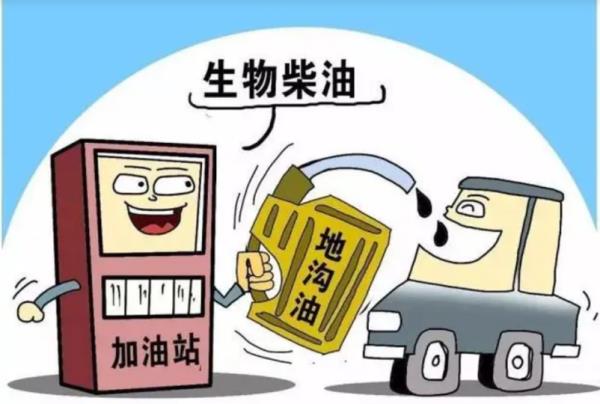
Waste oil becomes biofuel.
Why is it timely?
First, objectively speaking, China’s super-large city scale will definitely bring huge edible waste oil production capacity and corresponding treatment problems.
Secondly, the new energy technology revolution has an urgent need for the energy source of "non-petroleum way" based on environmental protection, strategic security, economy and people’s livelihood.
Turning waste into treasure, serving the transformation of new energy, and putting a bad guy who once threatened the national food safety on the right path can be said that the transformation of waste oil into biodiesel is another sense of "eliminating three evils around".
From an industrial point of view, what are its technical characteristics and operational difficulties?
First of all, the refining technology of gutter oil is not complicated, and its technological process can be simplified and summarized as follows: pretreatment (often removing moisture and odorous microorganisms by heating to improve its purity)-acid-base neutralization, esterification (further improving purity)-vacuum distillation (separating effective parts).
The logic of the technology is clear and simple, and the related process scale-up also has ready-made experience. For example, in the application field of biofuels in aerospace, Sinopec took the lead in making the first industrial production device of bio-jet fuel in China, which can effectively solve the problem of waste oil treatment in cities with a population of 10 million.
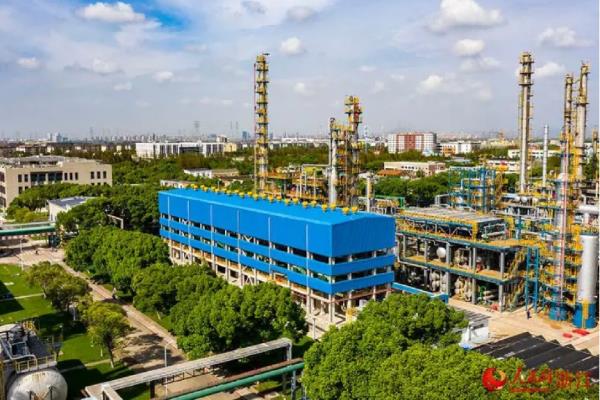
Waste oil goes to heaven-the first set of biological airborne media production base in China under Zhenhai Refining and Chemical Company of China Petrochemical Company.
The real difficulty faced by the gutter oil industry is actually more in the supply link, that is to say, how to effectively organize and collect the kitchen waste generated by restaurants and families in a megacity.
The "oil-water separation equipment" commonly used in the kitchen of restaurants is a means to optimize the collection process of kitchen waste oil.
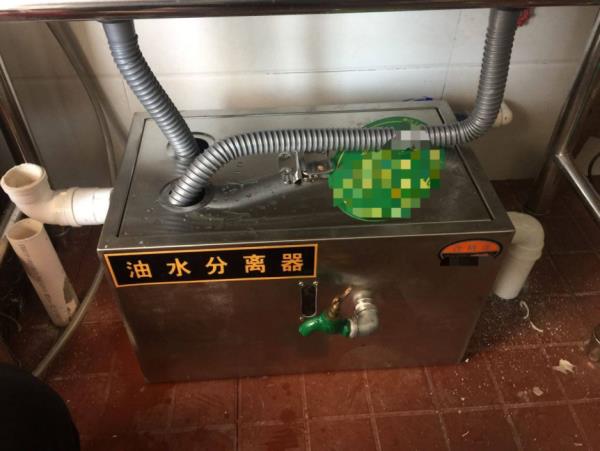
Common kitchen oil-water separation equipment
Speaking of this, you may think of the vigorous garbage sorting in previous years-do you think this matter will be vaguely related to the supply of waste oil-related industries? After all, the separate classification of kitchen waste can be regarded as reducing the collection cost of biological waste products such as waste oil from the source.
How to standardize its supply chain and reduce the "transaction cost" at the supply chain end is a very important issue.
For example, in order to better collect waste oil, Shanghai has set up a platform for the management of waste oil from kitchen waste in the early years, aiming at regulating all aspects of waste oil entering the biofuel industry, in which the supply link is the focus of work.
I talked about the basic logical path of industrialization when I deconstructed the PPT of American Emperor Technology. This path can be simplified as "technical link" → "industrial link" (dimension 1); And the industrial links are divided into "supply link" → "production link "→" sales link/market link "(dimension 2). To evaluate the industrialization prospect of a technology, we can start from these two dimensions to see whether the supply around it is convenient, whether the production cost is cost-effective and whether the market demand is large enough.
Based on the above logic, the current industrialization prospect of waste oil in China belongs to "no shortage of technology", "no shortage of production" and "no shortage of market". As long as the supply side is clear, a good industrial scale can be formed.
In the early years, a large number of gutter oil exports were also based on the big political background that the United States and the West first played environmental protection cards to contain developing countries. As China took the initiative to take over the green banner of carbon reduction and began to counter the United States and the West with environmental protection, the stage of waste oil in China gradually matured.
This brings us back to the U.S. sanctions against China gutter oil.
We should look at this matter from several aspects.
First of all, this news was released by the American Soybean Trade Organization; Why is this organization the first to speak? In fact, behind it is vivid business competition logic.
Everyone should know that gutter oil is just one of many raw materials for producing biofuels. As a crop product, soybean and other food crops are also raw materials for bioenergy production. For example, ethanol gasoline, which was popular in our early years, is a typical example (the source of ethanol fermented from food crops is still food crops after secondary processing).
As we all know, the agricultural production capacity in the United States is seriously surplus. On the one hand, the production capacity of a single crop on a large-scale 10,000-mu farm is really high. On the other hand, the population of the United States is a little over 300 million, which cannot be consumed. Therefore, from the perspective of relevant interest groups in the US food industry, the waste oil imported from China obviously robbed their business. It’s strange that these interest groups don’t speak out and lobby politicians to suppress you.
And another well-known fact is that interest groups buy politicians to speak for themselves, which is a common thing for the United States with "freedom, democracy and the rule of law". In this regard, even if politicians really stand up and respond, I am not surprised at all.
From another dimension, the Sino-US trade war and China’s food security will objectively squeeze the living space of American soybean merchants and force them to attach great importance to biofuels.
Will the United States impose tariffs on China waste oil affect domestic industries?
I don’t think this would be the case.
Or two dimensions, the first is the microscopic data dimension:
By 2021, the peak output of waste oil in China is 14.94 million tons; The corresponding export peak is only 1.14 million tons (data in 2021), and the overall export accounts for less than 10% of the total. It can be said that domestic demand is far greater than foreign demand.
In addition, in 2023, China’s total export of waste oil to the United States from January to August was 384,000 tons, accounting for less than 10% of the total output, but accounting for 65% of the total imports of related products in the United States. Therefore, it is actually clear at a glance who is active and who is passive in the import of waste oil.
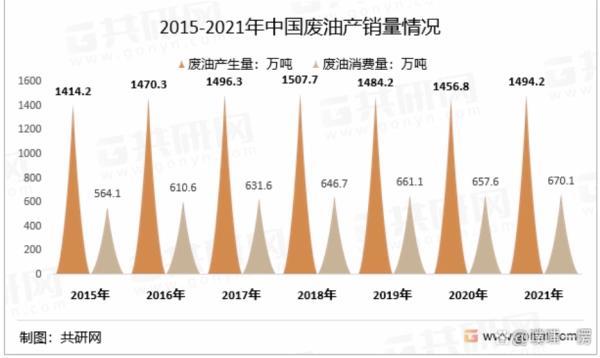
China Waste Oil Production and Marketing Data 2015-2021
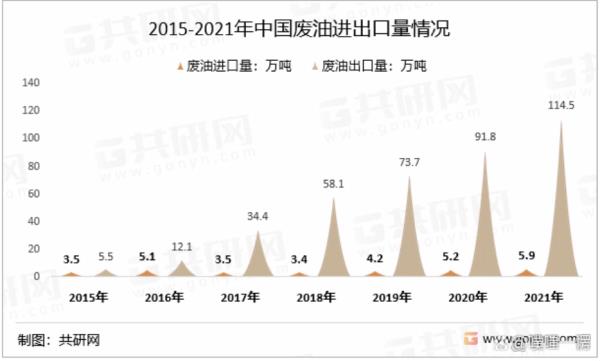
China Waste Oil Export Data 2015-2021
The second dimension, the global market dimension:
For gutter oil, on the one hand, China’s domestic demand is greater than foreign demand, and at the same time, there is still much room for domestic demand and related industrial chains to grow.
On the other hand, even if the issue of environmental protection is stranded in the United States, Europe still has to hold high the banner of environmental protection and engage in carbon footprint. The core underlying logic is that Europe has poor energy autonomy and lacks sufficient independent resources to support oil agriculture. Therefore, "ecology", "organic" and "green" will become its political banner to resist American oil agriculture all the year round.
From this perspective, China’s gutter oil can be sold to Europe instead of the United States. Although the energy problems brought about by the Russian-Ukrainian war in Europe have temporarily hindered its new energy industry. However, with the clarification of the situation in Russia and Ukraine and the deepening of China-EU cooperation, Germany and France, which are naturally blocked by fossil energy, will definitely not give up the development of new energy-related industries.
To put it more clearly, taking gutter oil as the topic of trade war is just like adding tariffs on commodities, which is a typical short-termism. Doing so can indeed benefit the grain merchants associated with the domestic soybean trade organization in the United States, but it is insignificant for the overall situation of the Sino-US economic game.
From this, I have the following two feelings:
Trade competition, in essence, is to master the competition of industrial chain.
Taking the gutter oil industry as an example, China firmly grasps the supply side (the high yield of gutter oil brought by the huge population scale), the production side (the unparalleled industrial scale) and the consumption side (the huge consumer market), and is in an invincible position in the industrial competition.
On the other hand, in the United States, in many commodity links, there is no supply, no production, no market, and the supply of the industrial chain is long enough, which makes the military taboo. In the end, it can only write more PPT and speculate on scientific and technological concepts to harvest the people brainwashed by neocolonialism all over the world.
Reuse of waste is the contemporary embodiment of Dayu’s wisdom in water control.
China’s culture stresses tolerance and dialectics. The once infamous gutter oil has now turned into a sharp weapon to serve the national new energy strategy. At the time of writing this article, I joked with my friends that it seems that gutter oil will become a strategic resource like rare earth in the future.
Joke aside, I have always said that industrial civilization can also reflect the characteristics of ecological civilization, and the industry of converting waste oil into biofuels is the most typical example. Europe once unilaterally emphasized green and organic, which is a part of ecological civilization, but its formation in Europe also has profound geopolitical factors behind it.
Industry and ecology are opposite and unified, and the key lies in what concept we human beings use to develop industry, whether to exhaust our resources and fish or to develop sustainably. Deconstructing ecological civilization to the end is a sustainable evolutionary concept that pursues moderate changes instead of extremes. This idea can in turn guide and tame the industry itself. Therefore, we should naturally jump out of the binary opposition between industry and ecology and see the possibility of their integration and balance in the strategy of great powers.
This article is an exclusive manuscript of Observer. The content of the article is purely the author’s personal opinion, and does not represent the platform’s view. It shall not be reproduced without authorization, otherwise legal responsibility will be investigated. Pay attention to the observer network WeChat guanchacn and read interesting articles every day.
